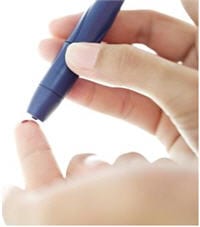Sticking with Safety: Eliminating Bloodborne Pathogen Risks during Blood Glucose Monitoring – May 3, 2010 – Meeting Overview
CDC has become increasingly concerned about the risks for transmitting hepatitis B virus (HBV) and other pathogens during finger-stick procedures, use of blood glucose monitoring devices and insulin pens. HBV infection outbreaks are occurring with increasing regularity during diabetes care, especially in long-term care settings such as nursing homes and assisted living facilities, and may represent a growing but under-recognized problem.

CDC Foundation, in collaboration with CDC’s Division of Healthcare Quality Promotion, Division of Viral Hepatitis and Division of Diabetes Translation hosted a meeting with industry representatives and other partners on Monday, May 3 at CDC in Atlanta to discuss this important public health issue.
The meeting objectives were as follows:
- Raise awareness of the risks for transmitting bloodborne and other pathogens during blood glucose monitoring and related diabetes care
- Learn about CDC’s efforts with other federal agencies and partners to define and address this problem
- Discuss voluntary strategies and opportunities for prevention in this area, with a particular focus on public-private partnerships (e.g., product innovation, improved education and marketing)
The participants included stakeholders from public health, healthcare facilities, professional organizations, and industry (listed below). Discussion centered on strategies for increasing awareness of infection risks in settings where many people require assistance with blood glucose monitoring, such as residential care and healthcare facilities, shelters, camps, and schools. The concept of assisted monitoring of blood glucose (AMBG), as an alternative to self monitoring of blood glucose (SMBG), was introduced as a means of providing a distinct framework for addressing infection prevention issues and increasing adherence to recommended practices. Speakers from CDC and other attendees emphasized the following safe AMBG practices:
- Only auto-disabling single-use lancet devices should be used for assisted monitoring of blood glucose
- Insulin pens are single patient use only
- Glucose meters should be assigned to individual patients whenever possible; if meters must be shared, the device used should take infection prevention into account and permit cleaning and disinfection after every use
Potential next steps were discussed and included updated and expanded safe practice recommendations and requirements, consensus guidelines, technologic innovations and an educational and awareness campaign.
- Abbott
- American Association of Diabetes Educators
- ARKRAY, Inc.
- B & D Consulting
- Bayer
- BD
- Centers for Disease Control and Prevention (CDC)
- CDC Foundation
- Centers for Medicare and Medicaid Services (CMS)
- Consultant for AgaMatrix, Inc.
- Diabetes Technology Society
- Facet Technologies
- Food and Drug Administration (FDA)
- J&J/LifeScan, Inc.
- Mayo Clinic
- Medline Industries, Inc.
- Medtronic, Inc.
- Mills-Peninsula Health Services
- Premier Safety Institute
- Professional Disposables International, Inc.
- Roche
- University of California, Berkeley
- University of Michigan
- U.S. Army
- Virginia Department of Health
- Infection Prevention during Blood Glucose Monitoring and Insulin Administration
- Assisted Monitoring of Blood Glucose: Special Safety Needs for a New Paradigm in Testing Glucose pdf icon[PDF – 5 pages]external icon Journal of Diabetes Science and Technology September 2010